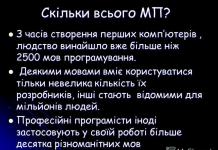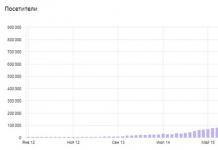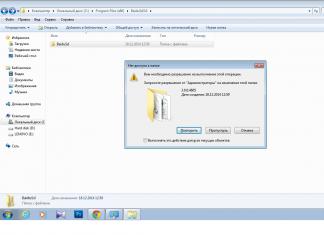Attention! The opinions of the people answering the question may not coincide with the opinions of the editors.
Who do you consider to be the best programmer of all time?

MITCH RHYS-JONES
programmer
“DONALD WHIP.
He is known for his monograph “The Art of Programming,” which consists of several volumes. It has detailed descriptions everything from data structures and random numbers to sorting, enumeration, and analysis of algorithms - a direction for which he laid the foundations. In all his books, he gave examples written in assembly language - machine instructions. Here's what Bill Gates said about this monograph: “If you consider yourself good programmer, read “The Art of Programming” by Knuth. If you can read it all, be sure to send me a resume.”
Knuth began working on the monograph in 1962 and has completed four volumes to date. The fifth volume will appear in 2020, which means it will take him 58 years to complete the five volumes. But he is going to write two more. And this is not to mention the fact that he created TeX, one of the most widespread computer layout systems, the METAFONT language for developing vector fonts, as well as the WEB and CWEB competent programming systems. He has been awarded the John von Neumann Medal, the Franklin Medal, the Turing Award and the US National Medal of Science. For his work on The Art of Programming, he was even given the title of Professor Emeritus of the Art of Programming."

programmer
"Anders Hejlsberg.
He wrote the Pascal compiler in assembly language for the two dominant operating systems of the time, DOS and CPM. The compiler was later included in the Turbo Pascal integrated development environment. Thanks to it, compiling, linking and running a program began to take seconds instead of minutes.
Heilsberg's compiler was bought by Borland International, which also hired the programmer. Borland sold the compiler along with a full development environment for much less money than its competitors. Thanks to Heilsberg, the productivity of programmers has increased significantly. Then I was so impressed by his work that I even wrote a book Using Turbo Pascal, first published in 1986. It can still be found on Amazon and eBay.
Anders Hejlsberg led the team that created Borland Delphi (Object Pascal), which was as fast as Turbo Pascal. Delphi currently ranks 11th in the TIOBE ranking of programming languages and development environments. Hejlsberg later went to work for Microsoft, where he led the development of C#, which is now ranked 5th in the TIOBE rankings.”

RAVI KUMAR
student
"Linus Torvalds.
Creator of Linux. Everyone knows that he can program better than Mark Zuckerberg and Bill Gates. In such a high-pressure, paranoid, money-making industry, no one could have foreseen the release of Linux, a free and open operating system that was the result of the collaboration of many programmers. He also created the Git file version control system and the professional diving program Subsurface.
James Gosling.
Creator of the Java language, which is used all over the world. Based on the PostScript page description language interpreter, he developed the Network Extensible Windowing System (NEWS), which distributes computing across the network. He worked on everything: ground-based analysis of telemetry from the ISIS 2 satellite, and the first version of the Emacs text editor for Unix, and much more.
Richard Stallman.
Founder Free Software Foundation and founder of the open source movement, one of the most important figures in history information technologies. He worked on the GPL, the world's most widely used license, including Linux, and the GCC compiler suite, text editor Emacs and other open source software."
Linus Torvalds, Donald Knuth, Richard Stallman, John Carmack - if not a name, then a legend. The online publication VentureBeat lists the most authoritative programmers in the global IT community.
Linus Torvalds
Created Linux, free operating system, in a dorm room at the University of Helsinki. Today, data centers and supercomputers run on Linux, and it is developed by a horde of open-source fans around the world.
Torvalds is known, in particular, for the fact that he does not mince words and does not try to please the public. At one of his recent talks, when he was asked from the audience whether he was scaring off members of the Linux community with his manner of communication, he replied: “I don’t give a damn about you.” There are the same jokes about Torvalds among developers as there are among ordinary people about Chuck Norris. For example, Torvalds can divide by zero and play 3D games by performing them source in your thoughts in real time.
Sir Tim Berners-Lee
The only one on this list who managed to earn a knighthood was knighted by the British Queen Elizabeth II. He is the creator of the Hypertext Transfer Protocol (HTTP), the technology on which the entire Internet is built.

He now heads the Alliance for accessible internet, a public interest organization backed by Google, Facebook and Microsoft, that aims to make broadband internet accessible to people around the world.
Donald Knuth

His academic work in computer science earned him the title "Father of Algorithm Analysis". Everything on the Internet, from the algorithm for selecting Facebook feeds to the algorithm for selecting similar products on Amazon, owes something to it. At 77, he is writing a book called The Art of Computer Programming. Knuth is also a professor emeritus at Stanford.
Brendan Ike

Language Creator Java programming Script, which in fact is a standard for web programming. Participated in the creation of Mozilla, a company that develops Firefox browser. He resigned as CEO when his financial support for a project to ban gay marriage in California became known.
Solomon Hikes

Creator of Docker, a technology that developers love because it packages an application and its entire environment into containers and delivers it to servers. Works like virtual machine, but much faster. Docker began as a side-project at dotCloud, but when the product turned out to be popular, the company experienced a pivot and soon became a unicorn.
Mark Zuckerberg

Creator of Facebook. Believes that the smaller and more flexible the team, the more successful it will be. Billionth social network serves "only" 10,000 people worldwide.
David Heinemeier Hansson

Known as DHH. Creator of Ruby on Rails, a super popular framework that earned him the title and Google's Hacker of the Year award in 2005.
Richard Stallman

He is known primarily for his fight for free software, the founder of GNU, the author of the idea of “copyleft” - as opposed to copyright. Very principled, does not use any proprietary developments.
Bram Cohen

The creator of the BitTorrent protocol, which gave users the ability to download files super fast. BitTorrent is incredibly popular, with a conservative estimate of its total user base at 250 million people worldwide. Last year, Thom Yorke tried distributing the album exclusively via BitTorrent. And yet, the capabilities of BitTorrent were primarily appreciated by Internet pirates.
James Gosling

Created the Java programming language while working at Sun Microsystems. After the company's takeover by Oracle in 2010, Gosling left, becoming one of Oracle's main critics. Since then, he worked for five months at Google until he joined the startup Liquid Robotics. He is also part of the team of the famous Ukrainian startup Jelastic as an independent director.
Björn Stroustrup

The Danish programmer created the C++ programming language in 1978, improving C. He is still active: he teaches at Texas A&M University, Columbia University, and is also employed at Morgan Stanley.
John Carmack

Co-founder of id Software. He is known all over the world as the creator of Doom. By the way, the idea for the game itself was born during a game of D&D, which the team held regularly at id Software headquarters for several years. Moreover, John was always the game master. He was the first to try out 3D graphics tricks that are still used today.
He is currently working at Oculus VR, which Facebook bought for $2 billion.
Programmers
Being a specialist, a programmer specializes in a subject area that covers knowledge, skills and abilities that one self-taught person can master effectively. The breadth of the subject area and the quality of skills for a programmer are individual. They depend on work experience, education, intelligence, innate inclinations, willpower, and social isolation.
Programmers- specialists in the field computer technology, modern software, automation of production and other processes.
Programmer- the profession of a person involved in the development of algorithms and programs based on mathematical models.
Programmers can be roughly divided into three categories:
- Application programmers are engaged in the development of software necessary for the operation of the organization. For example, this includes 1C programmers.
- System programmers They develop operating systems, interfaces to distributed databases, and work with networks. Specialists in this category are the rarest and highest paid.
- Web programmers deal with networks, but usually global ones, such as the Internet. They write web interfaces to databases, create dynamic web pages, etc.
The most famous programmers in the world
On September 12 (13), the professional holiday of programmers is celebrated all over the world. This is the 256th day of the year, chosen as an eight-bit byte character to express an identical number of values. In Russia, Programmer's Day became an official holiday in 2009.
Before the advent of the official holiday, Programmer's Day was celebrated on different days. For example, July 19 - when the first programmer Ada Augusta Lovelace , a mathematician from Great Britain, daughter of Byron, the first programs for Babbage's Analytical Engine, thereby laying the theoretical foundations of programming. She first introduced the concept of the operation cycle. In one of the notes, she expressed the main idea that the analytical engine can solve problems that, due to the difficulty of calculations, are almost impossible to solve manually. Thus, for the first time, a machine was considered not only as a mechanism that replaces a person, but also as a device capable of performing work beyond human capabilities.

John von Neumann , a Hungarian-American mathematician made important contributions to many branches of science, such as quantum physics, functional analysis and computer science. The name of von Neumann is associated with the architecture of most modern computers, implying joint storage of programs and data for them in the memory of a computer. In the last years of his life, he was mainly engaged in the development of issues related to the theory of games and the theory of automata.

Computer specialist Dennis Ritchie known for his participation in the creation of the programming languages BCPL, B, C, and the ALTRAN extension for the FORTRAN programming language. The C and FORTRAN languages have gained wide popularity in applied problems, and many later programming languages have been developed based on the C language. Ritchie also participated in the development of the Multics and UNIX operating systems.

Björn Stroustrup - author of the C++ programming language - one of the most widely used programming languages, developed on the basis of C. Stroustrup became a pioneer in the use of object-oriented programming, which allows you to create large-scale projects in a short time, distributing tasks between participants and using previously developed solutions. Several modern programming languages have been developed based on C++.

Alexey Pajitnov - Soviet programmer and inventor of the world famous and beloved game "Tetris". From 1996 to 2005 Pajitnov worked in Microsoft, where he developed Pandora's Box puzzles. In 2007 and 2009 he was awarded the Game Developers Choice Awards First Penguin Award.

Evgeniy Kaspersky - Russian programmer, software specialist information security, one of the founders, leading developer and largest shareholder of Kaspersky Lab CJSC. He is also a laureate of the state prize in the field of science and technology for 2008. He is the author of a large number of articles and reviews on the problem of computer virology, and regularly speaks at specialized seminars and conferences in Russia and abroad.

One of the co-founders of the search company "Yandex" Ilya Segalovich . Russian programmer, director of technology and development, as well as an active participant and organizer of assistance to orphans and sick children. Died on July 23, 2013.
In 1992 Boris Nuraliev
together with his brother Sergei Nuraliev, they created the accounting program "1C". In 1996, the company he headed released the 1C:Enterprise system and began developing computer games. In 2005, the 1C company became one of the three leaders in the Russian market of integrated enterprise management systems.
Computers - all kinds of them,
And the word “Internet” became fashionable
The age of programmers is the 21st century,
Man has reached the pinnacle of science!
Programmers are amazing people,
Modern and smart people,
With them everything is always relative
Virtually strives forward.
Ada was born in 1815, when a woman scientist was as rare in the world as divorce among the nobility. That didn’t stop her parents from getting a divorce soon after the baby’s birth. Byron saw her only once, because he soon left England forever. Mother Anna took up raising her daughter with all zeal. The best mathematicians of that time taught for her.
Ada was lucky in life. That time dictated that a woman of her position should marry some lord and give birth to his children, taking care of everyday life. It is now . But in her youth, the girl did not want to vegetate in marriage; she just met the creator of the first computer - the prototype of the current computer. Babbage gave lectures, and Ada was asked to translate them for a foreigner. She spent a lot of her time on the work, reworking and filling in the gaps in Babbage's scientific thought in the process. Her recordings are an example of the first programming.
This person in history can clearly claim to be one of the most atypical. Hollywood actresses of the 40s and 50s are associated with thoughtless, beautiful ingénues, flitting from party to party and dating. Australian native Hedy Lamarr is definitely not one of them. In between filming, the girl was actively engaged in research on everything in the world. In many European countries and in Australia, Inventor's Day is celebrated on November 9, as you can guess, it was on this day that this actress was born.In the 40s, Lammar and her friend patented an invention that made it possible to remotely control torpedoes over long distances. The actress figured out that it was necessary to create not just a communication channel that could be intercepted, but a random code. Such a breakthrough was associated with encryption and her abilities in this science. Alas, Lammar’s revolutionary system was not immediately recognized. However, 50 years later, this invention has evolved into what is today called smartphone and Wi-Fi connectivity.

With her husband, Mary worked with Manchester computers for a long time, fulfilling the needs of the military, and stood at the origins of the creation of the first commercial PCs. But there is one more feature. She gave birth to a son, Tim Berners Lee, who later became an Internet pioneer. Now it’s impossible to imagine your life without it, and any of them relate to the World Wide Web in one way or another.

This woman took a bold step and proposed making the OS user-centric. In the end, this is what changed Apple history and brought the company to unprecedented heights of success. To implement its plan, the company needed a product from NeXT, where the main genius of apple lovers worked at that time. As a result, Apple bought the company, and made Steve a like-minded person and the main inventor of the generation.


The young programmer worked on many projects. It was she who created all the developments for systems that have now become nothing more than graphical interface. Now Adele has her own company, Neometron, connected to the Internet. But she still supports various foundations and educational programs in general.

The girl herself was born in Pennsylvania, and received a bachelor’s degree, not a mathematics degree. Then she dramatically changes her field of interest and, after studying humanities, is actively involved in web site development. Its clients include the world's largest corporations. After the purchase of her brainchild by Yahoo!, Katarina worked for this giant. Not long ago, her website Hunch was purchased for a record amount of almost $100 million.

All of these women are a source of pride and can serve as incredible motivation for all of us. Many of them worked at a time when programming did not tolerate women, and world views on women's work were completely different. And yet they were successful. Now thousands of female programmers are proving that this is not only a male profession. All that remains is to take them as an example.
Among ordinary people, programmers are now a respected profession. After all, without them there would be no iPhones and Facebook, they create cool companies and they are among the few in Ukraine pegged to the dollar. Who is popular directly among IT specialists? VentureBeat is a list of legendary programmers who enjoy the greatest authority in the global IT community.
Linus Torvalds created Linux, a free operating system, in his dorm room at the University of Helsinki. Today, data centers and supercomputers run on Linux, and it is developed by a horde of freeware fans around the world.
Torvalds is known, in particular, for the fact that he does not mince words and does not try to please the public. At one of his recent talks, when he was asked from the audience whether he was scaring off members of the Linux community with his manner of communication, he replied: “I don’t give a damn about you.” There are the same jokes about Torvalds among developers as there are among ordinary people about Chuck Norris. For example, Torvalds can divide by zero and play 3D games by executing their source code in his mind in real time.
Sir Tim Berners-Lee- the only one on this list who managed to earn a knighthood - he was knighted by the British Queen Elizabeth II. He is the creator of the Hypertext Transfer Protocol (HTTP), the technology on which the entire Internet is built.

He now heads the Alliance for Affordable Internet, a public organization backed by Google, Facebook and Microsoft that aims to make broadband Internet accessible to people around the world.
Donald Knuth. His academic work in computer science earned him the title "Father of Algorithm Analysis". Everything on the web, from the algorithm for selecting Facebook feeds to the algorithm for selecting similar products on Amazon, owes something to it. He is already 77, but he still works. He is currently writing a book called The Art of Computer Programming. He is also a professor emeritus at Stanford.

Brendan Ike, creator of the JavaScript programming language, which is in fact the standard for web programming. Participated in the creation of Mozilla, the company that develops the Firefox browser. He resigned as CEO when his financial support for a project to ban gay marriage in California became known.

Solomon Hikes, creator of Docker, a technology beloved by developers because it packages code into containers and delivers it to servers. Works like a virtual machine, but much faster. Docker began as a side-project at dotCloud, but when the product turned out to be popular, the company experienced a pivot and soon became a unicorn.

Mark Zuckerberg, creator of Facebook. that the smaller and more flexible the team, the more successful it will be. The billion-dollar social network is served by “only” 10,000 people around the world.

David Heinemeier Hansson, known as DHH. Creator of Ruby on Rails, a super popular framework that earned him the title and Google Hacker of the Year award in 2005.

Richard Stallman, known primarily for his fight for free software, founder of GNU, author of the idea of “copyleft” - as opposed to copyright. Very principled, does not use any proprietary developments.

Bram Cohen, the creator of the BitTorrent protocol, which gave users the ability to download files super fast. BitTorrent is incredibly popular, with a conservative estimate of its total user base of 250 million people worldwide. Last year, Thom Yorke tried distributing the album exclusively via BitTorrent. And yet, the capabilities of BitTorrent were primarily appreciated by Internet pirates.

James Gosling, creator of the Java programming language. But you already know that. What you may not know is that James is a famous Ukrainian startup Jelastic as an independent director.

Bjarne Stroustrup, Danish programmer. In 1978, he created the C++ programming language, improving C. He is still active: he teaches at the University of Texas A&M, Columbia University, and is also employed at Morgan Stanley.

John Carmack, co-founder of id Software. He is known all over the world as the creator of Doom. By the way, the idea for the game itself was born during a game of D&D, which the team held regularly at id Software headquarters for several years. Moreover, John was always the game master. He was the first to try out 3D graphics tricks that are still used today.

He's currently working for the $2 billion company Oculus VR.
Noticed a mistake? Select it and click Ctrl+Enter to let us know.


























